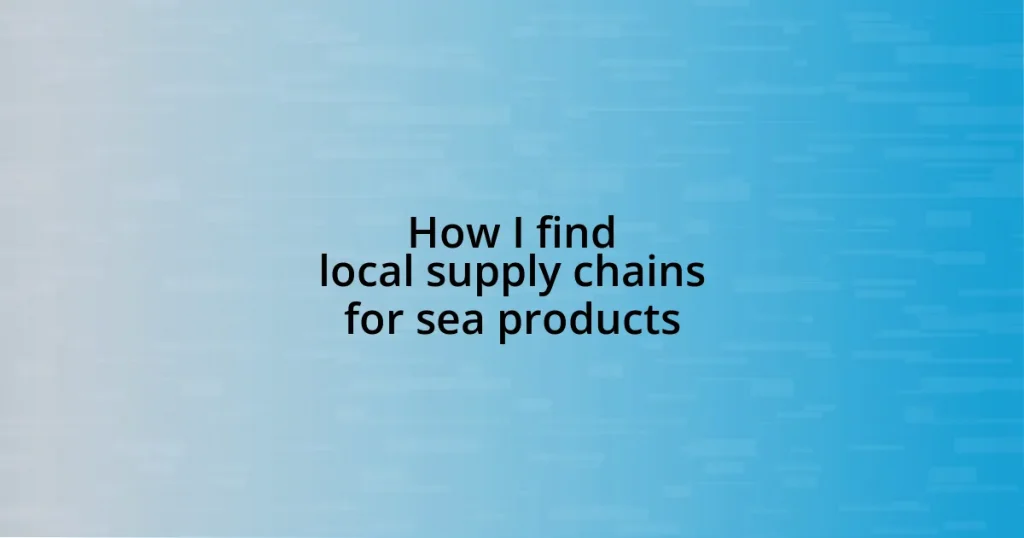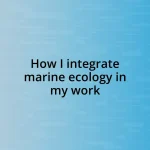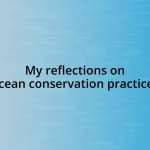Key takeaways:
- Understanding local supply chains emphasizes the interconnectedness of community, environment, and individual choices in food sourcing.
- Building relationships with suppliers fosters trust and transparency, essential for ensuring sustainable practices and quality seafood.
- Utilizing online resources and community events can help identify reliable local seafood suppliers while verifying their claims is crucial.
- Navigating regulations through local fisheries departments and staying informed about compliance changes enhances credibility and supports responsible sourcing.
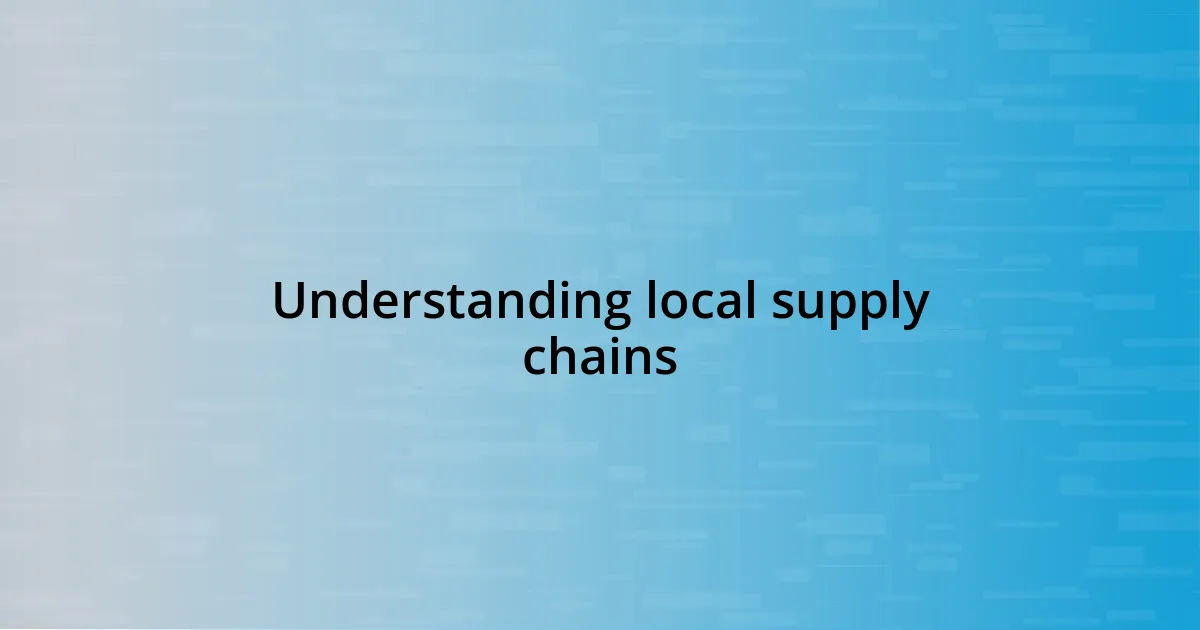
Understanding local supply chains
Understanding local supply chains is like uncovering a hidden gem in your community. I remember the first time I visited a local seafood festival and met fishermen who shared stories about their daily catch. It hit me then how deeply interconnected our local economies are and made me realize the importance of knowing where our food comes from.
Local supply chains often thrive on relationships and trust, especially in the seafood industry. When I chatted with a local supplier one afternoon, she explained how she only sources from fishermen who prioritize sustainable practices. It made me wonder—how many of us really consider the ripple effect our purchasing decisions have on the environment and the community?
The complexity of local supply chains can be surprising. Just because a product is labeled ‘local’ doesn’t guarantee a transparent path from ocean to plate. I once stumbled upon a gap in the supply chain while researching a favorite fish dish; it turned out that some ingredients were sourced from far more distant waters than I had ever imagined. This experience taught me that digging deeper can reveal both the strengths and weaknesses of my local supply chain.
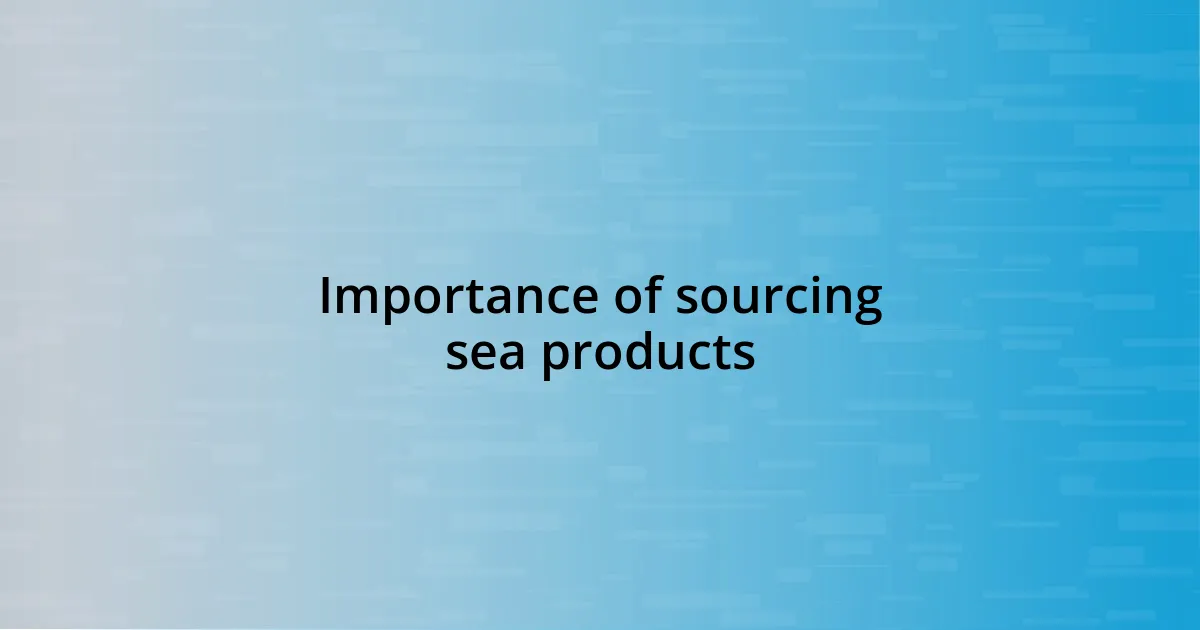
Importance of sourcing sea products
When it comes to sourcing sea products, I’ve found that the significance extends beyond just nourishment. It’s a bond between the community, the environment, and personal well-being. A few years ago, I visited a coastal town where I watched local fishermen haul in their catch. The camaraderie between them was palpable, filled with laughter and pride. It made me appreciate how vital these relationships are in ensuring fresh, quality seafood while supporting local livelihoods.
Here’s why sourcing sea products is so important:
- Supports Local Economies: Purchasing from local fishermen keeps money circulating within the community.
- Promotes Sustainability: Choosing sustainable sources ensures the health of marine ecosystems for future generations.
- Ensures Freshness: Local seafood is typically fresher, leading to better taste and nutritional value.
- Fosters Trust: By sourcing locally, I can develop relationships with suppliers and understand their practices.
- Reduces Environmental Impact: Shorter supply chains mean less transportation, leading to a smaller carbon footprint.
Reflecting on my experiences, I realize how much sourcing sea products can influence not just my dinner plate but the broader community and environment. Each decision I make is a step toward a healthier future, both for myself and my surroundings.
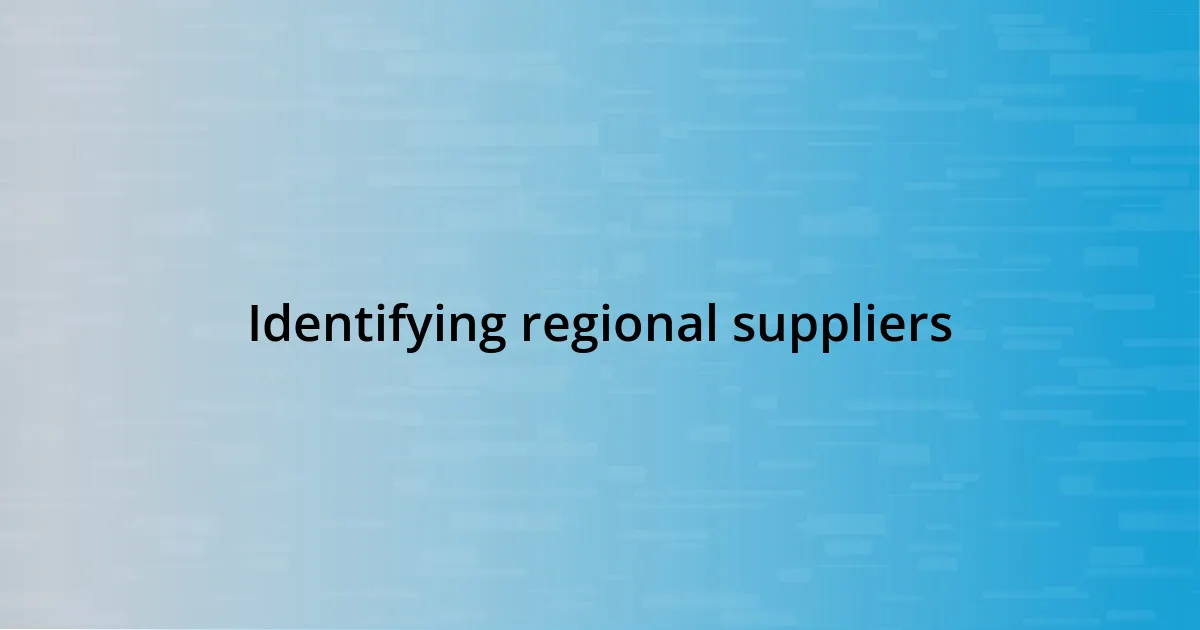
Identifying regional suppliers
Identifying regional suppliers begins with understanding the local community. I often start by attending community events and farmers’ markets where local seafood is sold. Just last summer, I struck up a conversation with a fisherman at a market who shared insights on the seasonal availability of his catch. These interactions not only help build trust but also provide valuable information about supply sources I wouldn’t have found online.
Networking is key. I made it a point to connect with chefs and restaurant owners who emphasize local sourcing. One chef I know takes pride in every fish dish he serves, knowing each is sourced from nearby waters. His passion helped me understand the importance of establishing strong relationships with suppliers who have a shared commitment to sustainability. The more I engaged, the clearer it became that these personal connections often lead to discovering hidden gem producers.
Researching online can also yield results, but it’s essential to evaluate these sources critically. I recall an experience where I found a supplier listed on a website but was disappointed to discover that they weren’t as local as I anticipated. This taught me the importance of confirming claims by visiting suppliers personally or seeking recommendations from trusted connections within the community.
| Method | Description |
|---|---|
| Community Events | Connect with local fishermen and suppliers through direct interaction at events. |
| Networking | Engage with chefs and restaurants that prioritize local sourcing to gain insights. |
| Online Research | Use online platforms to discover suppliers but verify their claims through direct contact. |
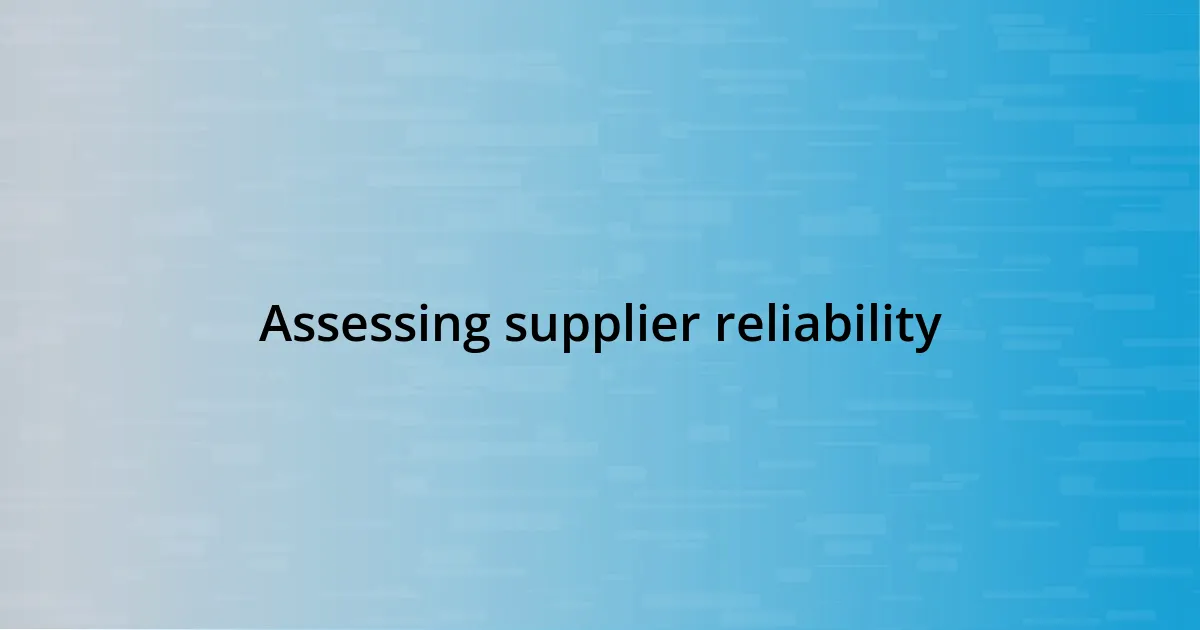
Assessing supplier reliability
When I assess supplier reliability, I always look for transparency. Just last month, I sat down with a local fisherman who openly discussed his catch limits and sustainable practices. Honestly, it was refreshing to see someone so committed to ethical fishing. Asking questions like, “How do you ensure the sustainability of your catch?” not only shows my interest but also reveals the supplier’s dedication to responsible practices.
I also consider reviews and word-of-mouth recommendations. I remember attending a seafood festival where other buyers were raving about a specific supplier’s quality and consistency. That buzz drew me in, and following up with those recommendations often leads to suppliers who are both reliable and trustworthy. It’s fascinating how a community can collectively identify who the best partners are simply through shared experiences.
Lastly, I take note of how suppliers handle any challenges. Once, I encountered a scenario where a supplier faced a sudden bait shortage. Their proactive communication and quick adaptations impressed me. Are they resilient in the face of unforeseen events? A supplier’s response during tough times reveals their reliability and commitment to customer satisfaction. I find that being observant about these qualities helps me build long-lasting partnerships.
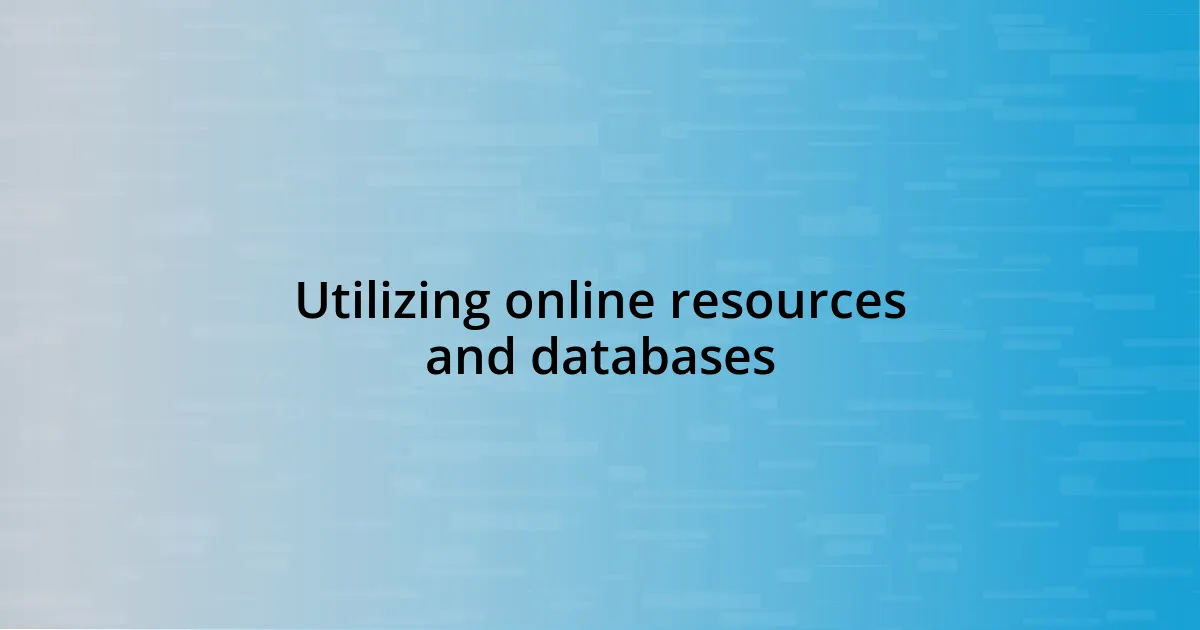
Utilizing online resources and databases
Utilizing online resources and databases can be a real game changer when searching for local seafood suppliers. I often start with platforms like SeafoodSource or FishChoice, which boast valuable directories. I remember the time I discovered a small, family-run fishery in my area through an online database. Their commitment to sustainable practices truly resonated with me, and it was exhilarating to connect directly via their website.
Social media is another fantastic tool. I find Facebook groups or Instagram accounts dedicated to local sea products quite insightful. One day, while scrolling through my feed, I stumbled upon a post from a local fisherman showcasing his daily catch. His enthusiasm was contagious, and it sparked my curiosity to reach out. I asked him about his fishing techniques and was amazed by the knowledge he shared. This interaction not only deepened my appreciation for his work but also led to a fruitful partnership that I didn’t expect.
While searching online, I always emphasize the importance of thorough research. It’s tempting to take listings at face value, but I learned the hard way that not every supplier is what they seem. A quick glance could lead you to a supplier with an enticing website but lacking in real connections. I urge you to dig deeper and confirm details with a quick phone call or email. After all, a little extra effort could open doors to the best local seafood sources that fit your needs perfectly.
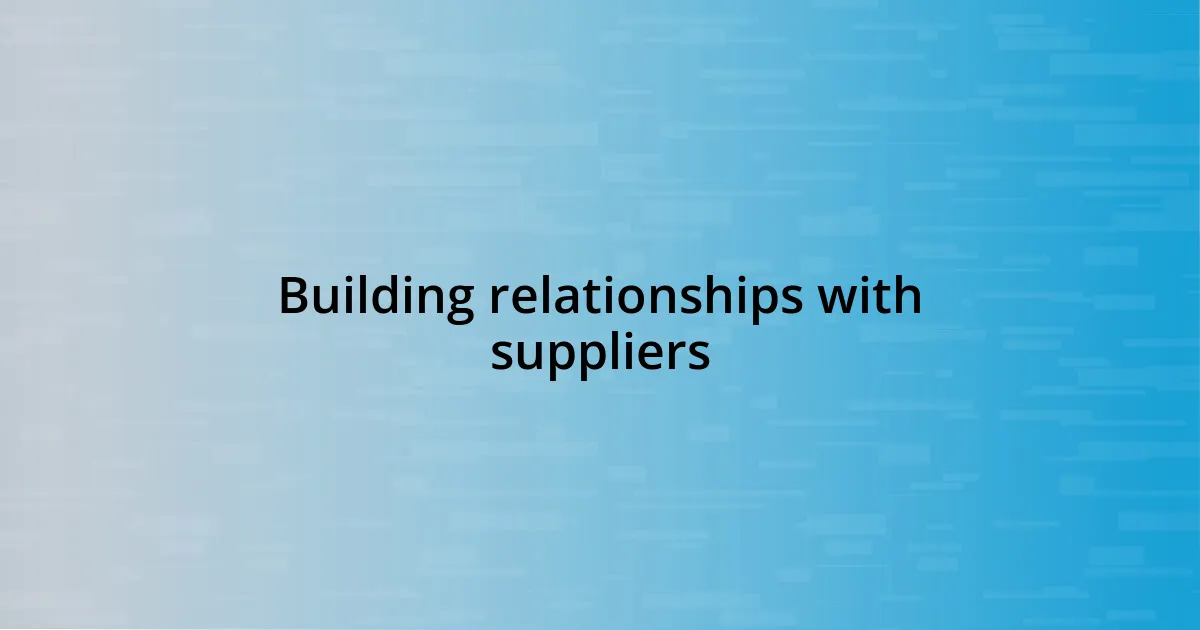
Building relationships with suppliers
Building lasting relationships with suppliers is crucial in the seafood industry. I remember my first meeting with a small local processor; we spent hours chatting about their methods and my needs. That genuine exchange laid the foundation for a great partnership. When suppliers feel appreciated and understood, they’re more likely to go the extra mile for you.
Trust is essential in these interactions. I once faced a situation where a supplier had to increase prices unexpectedly because of market conditions. Instead of hiding behind emails, he called me personally to explain the reasoning. I valued that honesty; it transformed our working relationship into one based on mutual respect. Trust fosters open communication, which is vital when navigating the challenges this industry can present.
Additionally, following up after initial meetings can solidify those bonds. After a significant order, I like to send a simple thank you note or even a quick text. It’s amazing how such small gestures can keep the lines of communication open. Have you ever thought about how a little appreciation can transform a business interaction? From my experience, building relationships with suppliers is as much about creating a community as it is about the business itself.
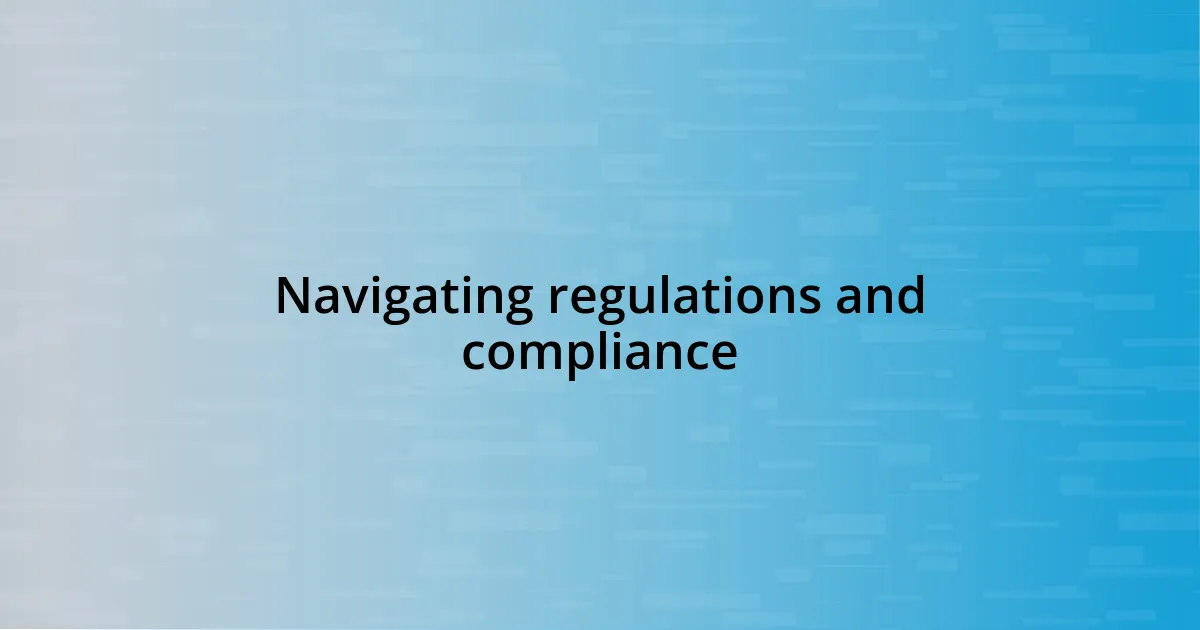
Navigating regulations and compliance
Navigating regulations and compliance can feel daunting, especially in the seafood industry. I remember diving into the maze of local and federal regulations when I first started sourcing seafood. I felt overwhelmed, but then I discovered that contacting local fisheries departments was incredibly beneficial. They not only provided clarity on licensing requirements but also shared insights on sustainable practices that were essential for compliance. Have you ever considered that reaching out for guidance could actually simplify the process? It certainly did for me.
Another vital aspect is staying informed about changes in regulations. I sign up for newsletters from organizations like NOAA (National Oceanic and Atmospheric Administration), which constantly updates me on any shifts in compliance standards. I’ve found it invaluable, especially when a supplier once informed me about new labeling laws that stressed traceability. I made sure to adjust my practices right away, preventing potential issues down the line. It’s moments like these that show how crucial it is to remain proactive and informed.
Finally, understanding the importance of traceability in the seafood supply chain cannot be understated. When I worked with a local supplier who sourced fish from sustainable fisheries, I took the time to learn their traceability practices. Not only did this satisfy regulatory requirements, but it also gave me peace of mind knowing I was supporting responsible fishing methods. Have you thought about how traceability can enhance your credibility as a buyer? I believe that customers today are more inclined to choose suppliers who can confidently vouch for the origins of their products.











